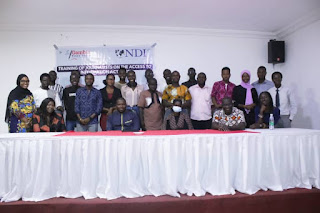GPU Concludes Training On ATI Law For Journalists’
By Sheriff Saidykhan
The Gambia Press Union (GPU) in partnership with the National Democratic Institute (NDI) has on Friday 10, February 2023 concluded a two day capacity building training for media practitioners on the use of Access to Information (ATI) law for news reporting and towards ensuring transperancy in governance.
Access to Information refers to the right, which members of the society have to access information held by government officials and institutions. The information legislation was adopted through the National Assembly of The Gambia in July, 2021.
Speaking at the event held at Metzy hotel in Kotu, the President of the Gambia Press Union, Muhammed S Bah underscored the significance of the access to Information Act for journalists’.
“The Access to Information Act, 2021, provides an enforceable right for journalists to access official documents held by public officials. Under the Act, journalists have a right to request, process, and disseminate public information held by public bodies to the general public. The Act also provides guidelines for an appeal to the Information Commission for violation of the right to access information by public bodies. This will enhance democracy, ensure citizens’ participation and build greater trust in Government decision-making,” he said.
Lala Touray, Senior Programme Associate at the National Democratic Institute explained the rationale behind the project.
“The project seeks to support the implementation of the Gambia’s Access to Information Act, 2021, and to encourage the use of the legislation to promote transparency and accountability in government,” said Lala Touray.
She further highlighted the importance of the ATI legislation for journalists’ saying it will help journalists to understand the context, and to create public awareness about the law, its application, use and benefits.
John Charles Njie, the Chairperson of CSO coalition on ATI challenged journalists’ to ask hard questions about the implementation of the Information Commission of the Act.
“Journalists should be able to ask the hard questions. There is a grace period for the implementation of the access to information law, by February (2023) we should have had an Information Commission, but we have not heard any information regarding the establishment of a Commission, therefore, questions needs to be asked. I hope, from this training, journalists will look at the law, and each and everyone of you will be writing stories that looks into the status of implementation of the ATI law,” he said.
He further urged journalists to serialise sections of the ATI law in order to create public awareness.
“The CSO Coalition on ATI and the GPU have done a lot of work, sensitising members of the public and other stakeholders on access to information, however, there have not been much media publications on the law, and a majority of the population are not aware of the law. Journalists need to amplify media coverage on the right to information, the benefits of access to information, and how people can utilise the ATI law to ensure transparency and accountability in government,” he concluded.



.jpeg)
Comments
Post a Comment